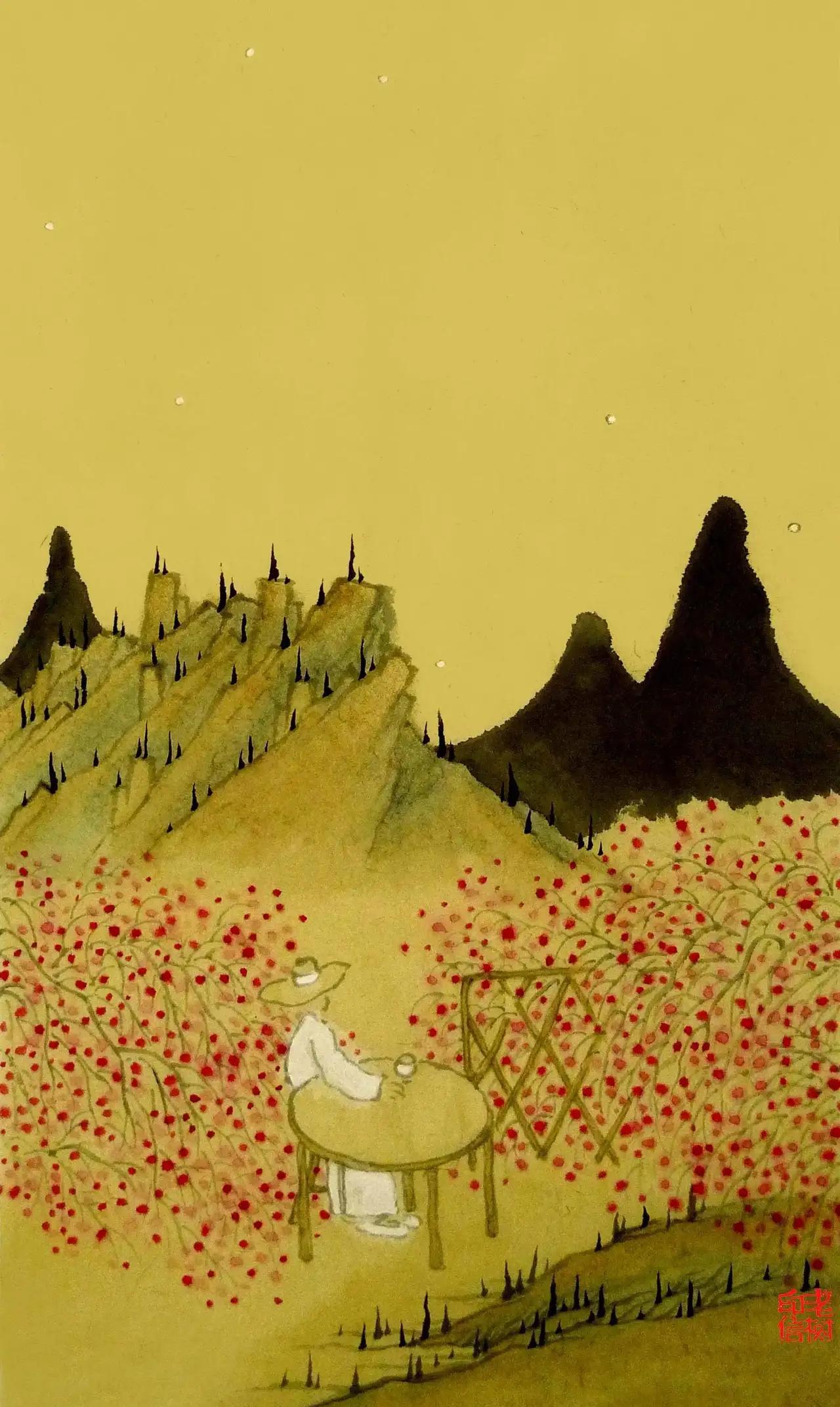
Often envious of the life of the ancient literati, leisurely but poetic, even writing sick content, can be so playful and funny.
Read the Southern Song Dynasty poet Zhao Shixiu's last sentence "A Few Days", you will feel that the original illness to see autumn colors, poetry can be written like this.
"A Few Days" Zhao Shixiu
A few days of autumn wind bullying the sick man,
Blow the yellow leaves under the garden.
The forest is scattered far out of the mountains,
Half obscured by clouds.
Zhao Shixiu, a southern Song Dynasty man, admired the poetic style of the Tang Dynasty poets Yao He and Jia Dao, and he was also a master of refining words. In the last sentence of this poem "A Few Days", I think that there are two words that are used best.
First, in the first sentence, the word "deception" in "a few days of autumn wind bullying the sick man" uses an anthropomorphic technique here to give autumn wind human spirituality. It is like a mischievous child, blowing away the fallen leaves, making the courtyard deserted; and even more teasing the weak, because of the autumn wind, they are cold, and only then do they have physical discomfort. And the poet, for such a mischievous ghost, is helpless, seemingly complaining, but it is actually ridicule, in the confrontation that seems to be weak and strong, one solemn and one harmonious, full of the pleasure of life.
The second is the word "put" in the fourth sentence, "Lin Shu is far away from the mountain", which opens the reader's vision. From the courtyard nearby, I suddenly looked into the distance and saw the mountains in the distance, blown by the autumn wind, the leaves had fallen into the forest, and the previous appearance of the green trees was changed, and the original shape was revealed, giving people a bright visual impact.
At the same time, it cleverly uses anthropomorphic techniques. At the end of the autumn and winter solstice, the mountain forest slowly opens a huge curtain made of leaves, so that the true face of the mountain can be seen. And the poet borrowed flowers to offer Buddha, and with only a few figures, he presented a huge winter landscape of the mountains in front of the reader.
Therefore, this short 28-word poem is a wonderful landscape picture, poetic and picturesque, and perfectly integrated.
Since there is a sense of painting, there is a sense of composition in it. The beauty of the composition lies in the last sentence, "Half obscured by the clouds".
Originally the leaves fell in the forest, the overall style of the distant mountains has been displayed, who knows that the poet's pen turned sharply, and then pulled a large number of clouds to decorate the mountains, so that the long-range view of the mountains that had just opened the curtain seemed to be shrouded in a thin layer of cloud veil, like a dream, suddenly adding a bit of mysterious charm.
And this kind of close-up view from the courtyard full of fallen leaves, suddenly pushed to the mountains, surrounded by clouds and fog, seems to use the film montage of the performance of the technique, from this point of view, the poetry with a sense of picture is the originator of the lyrical narrative using the lens. Appreciating such poems more can also achieve the effect of touching bypass, which is really a surprise in addition to surprises.
Although Zhao Shixiu was the eighth grandson of Song Taizu, he had a bad career in his life, and he had only been a petty official for a few years, and he wanted to come to the royal family to his generation, and he had gradually dissipated. Although life is not difficult, there will be no extravagant capital. However, living in a quiet place, reading and chanting, idly watching the fallen leaves in front of the court, and overlooking the magnificence of the mountains in the distance are still the joys of life.
Another example is Tao Yuanming, who let a good official not do it, and insisted on resigning from the official and returning to hiding. He said, "There is little vulgar rhyme, and sex loves the hills and mountains", and after returning to seclusion, he became a farmer, but his livelihood became a problem. But for a literati like Tao Yuanming, spiritual pursuits are always greater than material.
Therefore, although he "planted beans under the South Mountain, grass was full of beans and seedlings", the harvest was not good, and the living standards directly declined, as long as he could "pick chrysanthemums under the eastern fence and leisurely see the South Mountain", the various deficiencies in life would not be nothing.
So I often think that a person's material needs are really limited, but on the spiritual level, their pursuits are infinite. With unlimited spiritual pursuit, the heart will be rich, it will be full, and there will be a sense of security and happiness.